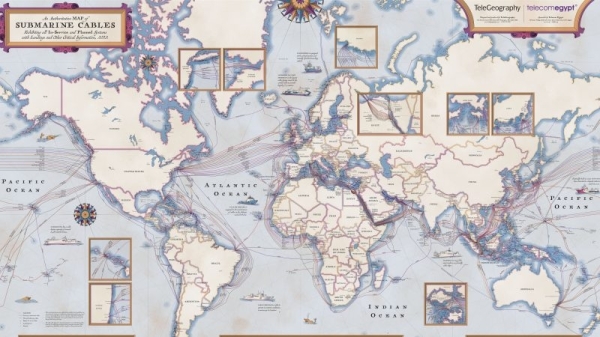South China Sea tensions conceal a secret war to control the world’s Internet

The future of the entire internet will depend on which countries dominate the South China Sea, writes Maurizio Geri.
With the US and Philippines holding the largest-ever military drills in the South China Sea, followed by China and Singapore, tensions over control of the strategic waterway are increasing.
As one of the world’s most important shipping lanes for oil, minerals and food, whoever dominates the South China Sea will control over a fifth of global trade. But the most significant economic asset up for grabs in the region is Big Data – and the future of the entire internet depends on which countries dominate the South China Sea.
Some 486 undersea cables carry over 99% of all international internet traffic, according to the Washington-based research firm TeleGeography. The US has a first-mover advantage: the bulk of them are controlled by a few American technology giants, namely Google-owner Alphabet, Facebook-owner Meta, Amazon and Microsoft.
Transmitting everything from emails and banking transactions to military secrets, these data flows are more valuable than oil. With information at the centre of technological innovation, controlling data is the key to economic productivity. As such, the world’s subsea cabling infrastructure is increasingly vulnerable to sabotage and espionage – spy agencies can easily tap into cables on their own territory.
That’s why geopolitical rivalry between the US and China has increasingly focused on control of the world’s subsea cabling networks over the last decade. Southeast Asia’s internet economy is forecast to reach $1 trillion by 2030.
The New Great Game
China plans a $500 million undersea internet cable network to create a superfast connection linking Asia with the Middle East and Europe. It also impeded US-backed projects for subsea internet cables through the South China Sea by delaying licensing approvals and creating stricter operating restrictions.
The US government has thwarted several Chinese subsea cabling projects in the Asia-Pacific over concerns about Beijing’s surveillance capabilities. At least six private undersea cable deals led by Google, Meta and Amazon that would have connected the US with Hong Kong were blocked by Washington to keep HMN Tech, a subsidiary of the sanctioned Chinese firm Huawei, at bay.
The US fears the Chinese cabling advance is a trojan horse for military and economic expansion. HMN Tech has won praise from the Chinese government for being a model of “civil-military integration,” A press release available only on the Chinese-language version of its website notes the company will “offer powerful support for the modernisation of our country’s national defence.”
The Great Divide
To bypass Chinese control, American tech giants Facebook and Google are building Apricot, the first intra-Asian subsea cable avoiding Hong Kong. The 12,000 km submarine cable will connect Japan, Taiwan, Guam, the Philippines, Indonesia and Singapore – but excludes Malaysia, an influential member of the 10-member Association of Southeast Asian Nations (ASEAN), which has fast become the linchpin of US and Chinese competition to dominate the global internet.
Malaysia’s involvement in Apricot was scuppered due to a 2020 ‘cabotage’ ban on foreign vessels in the autonomous Sabah region of eastern Malaysia to protect the local shipping industry from foreign competition.
A request from US tech giants Facebook, Google, Microsoft and Amazon to the Malaysian government complaining that the ban would obstruct the new cable venture and requesting an urgent meeting with the prime minister, was ignored. As a result, Malaysia has been excluded from the Apricot route and the Echo and Bifrost cable routes across the South China Sea, backed by Facebook and Google.
Local frustration over Malaysia’s ‘cabotage’ ban has revived demands in Sabah for greater autonomy from the federal government. This dovetails with a major international legal case challenging Malaysia’s sovereignty over Sabah on behalf of nine heirs of a colonial-era Sultanate in the remote Sulu archipelago of the Philippines.
The Sultanate purportedly leased the region of Sabah to British colonists in 1878 in return for an annual payment that the petitioners used to justify claiming a percentage of Malaysia’s oil and gas profits from production in Sabah.
The lawyers representing the Sulu heirs have deep ties with the same US tech giants embroiled in competition to dominate subsea internet cables in the South China Sea.
Paul Cohen, previously a speechwriter on the Clinton/Gore Presidential Campaign, currently serves as President of the Silicon Valley Arbitration and Mediation Center, where he works in “dialogue” with these US tech firms. Cohen’s colleague, Elisabeth Mason, founded and launched the Stanford Poverty and Technology Lab with support from the Obama White House and Facebook founder Mark Zuckerberg. Mason is also a board member of the US charity All-Star Code alongside three senior Google executives.
This proximity of the Sulu heirs’ lawyers to US tech giants heavily invested in the competition to dominate subsea internet cables in the South China Sea will exacerbate Malaysian perceptions of a Western system hostile to its national interests.
The Future of the Internet
Unfortunately, Malaysia’s exclusion from US-backed subsea cabling projects has accelerated the country’s alliance with China.
In 2022, Malaysia joined the 5,000km China-backed South East Asia Hainan Hong Kong Express Cable System (SEA-H2X), linking Hong Kong, China, the Philippines, and Thailand to eastern Malaysia and Singapore. And ironically, it is China that might benefit from Malaysia’s sovereignty over Sabah being undermined in the Sulu case, given China claims ownership over oil and gas fields in Sabah-Sarawak.
Therefore, a business-as-usual approach by America’s tech giants is likely to backfire – incentivising Malaysia to move closer into China’s orbit. The future of the global internet is at stake. If Malaysia falls under Chinese dominance, it will have significant repercussions across ASEAN, potentially inspiring other regional powers to follow suit in a domino effect.
With a new government under the premiership of longtime democracy activist Anwar Ibrahim, the US has a fresh opportunity for rapprochement. Time is of the essence, though. Prime Minister Ibrahim’s first global trip was to China in March, where he met with President Xi Jinping and secured $38 billion in investment pledges. The US must head this off with a much more active role in the region to ensure that partners like Malaysia stay the course.



